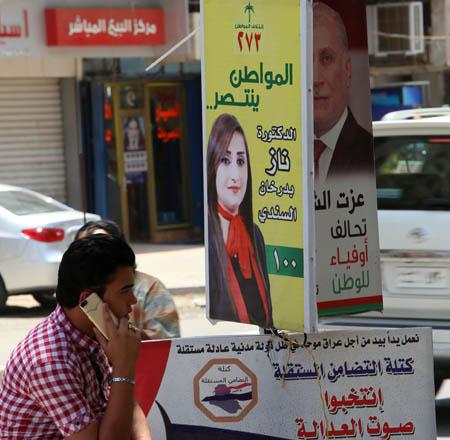You are here
Iraq attacks kill at least 57 as security forces vote
By AFP - Apr 28,2014 - Last updated at Apr 28,2014
BAGHDAD — Attacks including a spate of suicide bombings killed 57 people on Monday as soldiers and policemen cast their votes in Iraq’s first parliamentary election since US troops withdrew.
The bombings in Baghdad and the north and west raise serious concerns about the security forces’ ability to protect ordinary voters on polling day on Wednesday, when more than 20 million are eligible to take part.
They come amid a protracted surge in violence and fears the country is edging towards all-out conflict.
Nine attackers wearing suicide belts mostly targeted polling stations in Baghdad and cities north of the capital, while roadside bombs struck military convoys and targeted journalists covering the election.
The deadliest attack struck northeast of Baghdad in the mostly-Kurdish town of Khanaqin, near Iraq’s border with Iran.
A suicide bomber killed 30 people who had gathered to celebrate the release of a video purporting to show ailing President Jalal Talabani casting his vote in Germany, where he is receiving treatment for a stroke.
At least 50 others were wounded in the attack, which struck near the offices of Talabani’s Patriotic Union of Kurdistan in the town.
Two suicide bombers also struck the capital.
At one polling station in west Baghdad where a militant armed with an explosives-rigged vest killed seven policemen, ambulances ferried off the wounded as soldiers cordoned off the street, an AFP journalist reported.
Five members of the security forces were killed by another suicide bomber at a polling station in the city’s north.
Attacks elsewhere in the country killed 15 members of the security forces, officials said. Overall, more than 120 people were wounded in the bloodshed.
In the main northern city of Mosul, six Iraqi journalists were wounded as a bomb exploded while they were in a military vehicle to cover the vote.
The blasts shattered an early morning calm as soldiers and policemen queued outside polling stations amid tight security, before leaving with the traditional purple ink-stained finger indicating they had voted.
No group claimed responsibility for the bloodshed, but Sunni militant groups have been accused of carrying out previous suicide bombings in an attempt to derail the political process.
Government officials did not publicly comment on the attacks.
Prime Minister Nouri Al Maliki, who hails from Iraq’s Shiite Arab majority and is accused by critics of monopolising power and targeting minority groups, is seeking a third term in Wednesday’s election.
But there is widespread public frustration over poor basic services, rampant corruption and high unemployment, as well as the persistent violence.
‘Iraqis want change’
The month-long campaign has seen Baghdad and other cities plastered with posters and decked out in bunting, as candidates have taken to the streets, staged loud rallies and challenged each other in angry debates.
“All Iraqis have a desire for change,” said Jawad Kadhim, a police sergeant.
“There should be a change from the previous government which has failed in all senses of the word. The parliament did not do anything.”
Along with more than 800,000 members of the security forces eligible to vote at upwards of 500 polling stations nationwide, hospital and prison staff, patients and inmates were also voting on Monday.
Polls officially closed at 6:00pm (1500 GMT) for special balloting and overseas voters.
Attacks on candidates and their campaign staff and rallies have cast a shadow over the election, and parts of Iraq that have been out of government control for months will not see any voting.
Authorities announced a week-long public holiday to try to bolster security for the election.
The unrest is the latest in a months-long surge in violence that has claimed nearly 3,000 lives already this year, while anti-government fighters have held the town of Fallujah a short drive from Baghdad since the beginning of the year.
Although voters have a long list of grievances, in addition to the near-daily violence, the election has centred on Maliki’s efforts to stay in power.
His opponents, who span the communal spectrum, accuse him of shoring up his power base, and Sunni Arabs in particular say the 63-year-old incumbent discriminates against them.
Maliki contends that foreign interference is behind deteriorating security and complains of being saddled with a unity government of groups that snipe at him in public and block his efforts to pass legislation.
Analysts and diplomats say that with a fractious and divided opposition and no clear replacement, Maliki remains the frontrunner.
No single party is likely to win an absolute majority, and as with previous elections, coalition talks are expected to take months.
Related Articles
An officer in the Iraqi president’s guard shot dead a well-known radio journalist during a quarrel Saturday near the leader’s east Baghdad residence, police said.
Twin bombings killed 15 people northeast of Baghdad Tuesday, the latest in a wave of deadly violence that has cast a pall over Iraq’s first general election since US troops withdrew.
Iraqis defied a rash of attacks that killed seven people to vote Wednesday in the country’s first general election since US troops withdrew, with premier Nouri Maliki proclaiming “certain” victory.















